 About GamePeople
About GamePeople
Subscribe to the Faithful Gamer column:![]() RSS or
RSS or
![]() Newsletter.
Newsletter.
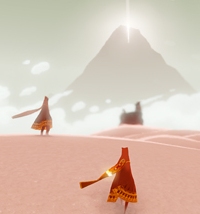
Further reading:
TEDx
Worship Service
Times Articles of Faith
The Star Sunday
Expose Magazine
Buy/Support:
Support Andy, click to buy via us...
Rather than standing on opposite sides of the debate, religion and video games have a lot in common. Of greatest interest to me it their similar posession of overlooked stories that offer meaningful ways to view life and the future.
To be human is to be a storyteller I said in my TEDx talk and videogames offer a new way to tell those stories.
That's a pretty grand claim for Call of Duty, Resident Evil, Grand Theft Auto and a thousand other games we pour millions of pounds into. However, video games are much more diverse than this. As you encounter more of their outer reaches it becomes clear that they are entirely distinct from books, films and theatre. They offer a unique way to present stories and understand the world.
It was in 1947 that Goldsmith and Mann filed their patent for a "cathode ray tube amusement device" and created this new medium. It may seem that modern games are something entirely different to those early experiences but in essence they are the same.
As Tadhg Kelly put it in his essay on videogames:
"Game makers often think that one day, when the technology is good enough or the audience is educated enough, games will become something more. I disagree. Games as they will be in the future will be the same as games as they are today, and the same as games when they were first invented."
My storytelling claim needs a little adjustment when you think about games like Pac Man and Space Invaders. Rather than a new way to tell or show stories, games are actually a new way to encounter them. Rather than coming to maturity by achieving film-like presentation or book-like narrative, games address stories uniquely with play and interaction and agency. Without a word, without dialogue, without direction video games can engage the emotions and address themes in new and ground breaking ways.
The problem is that video games aren't quite there yet. The majority of big budget titles still think they need to be like films and books, and have a tendency towards violence. The marketing and publishing engine hasn't the vocabulary or awareness to champion games that stray from the usual explosions, stereotypical body image and shooting.
This means the world has become divided into gamers and non-gamers in a way we wouldn't accept for books or films. Imagine asking someone if they were a readers or a watcher. Gamers then entrench into defence of their hobby and non-gamers usually look down on their juvenile pursuits.
We need to escape the desire for games to be like films and books, if we are to move beyond this gamer/non-gamer distinction so that more of us can access this rich pool of stories that we invest millions of pounds in every year. Rather than asking how good the graphics or sounds are, instead we should ask of our games
- Do they separate storytelling and gameplay?
- Do they create an open world we explore at our own haphazard pace?
- Do they provide a safe space in which to explore taboo subjects?
These sorts of questions are a clumsy way of identifying games in which we encounter stories rather than being told them like in books or seeing them like with film. We are looking for what Roger Ebert describes as the flow of creativity
"Anyone who has ever painted or drawn knows the experience of dropping out of the world of words and time. A state of reverie takes over; there is no sensation of the passing of hours. The voice inside our head that allows us to talk to ourselves falls silent, and there is only colour, form, texture and the way things flow together."
We can answer these questions in a pure way, with games that only work because they are games.
Whether it is Flower's ability to remind me of the power of creation, Limbo's redefinition of salvation as residency rather than escape, thinking about family tensions in Let's Catch or Journey's collaborative quest these video games enable us to engage in topics unlike any other medium.
We can also answer these questions more pragmatically, with games that haven't quite shaken the habit of telling and showing.
Uncharted presents a man's struggle between his obsession for treasure and his wife. Heavy Rain presents a parent worried that he is to blame for the loss of his child. Alan Wake charts the relationship between art and insanity. Although these are more muddled, and often more violent they still offer meaningful experiences.
It's a sifting process will be different for everyone, your list of games will be different to mine. This making sense of video games is a two stage process I think.
Firstly, finding meaning in games, of sensing stories that are interesting, entertaining and engaging. Secondly, connecting these stories to real life be that our own, our communities or those on the margins. This is essentially what faith communities have always done with their texts -- interpreted them to make them real.
This represents a double opportunity for video games and faith. Games offer new ways for faith communities to encounter mystery, approach truth and revel in reality. Faith offers games a foothold in society with its tradition of connecting these kinds of resources with everyday life.
In this way a Christian response to video games should be fuelled by our skills as story handlers rather than the desire to inoculate ourselves and our children from loss, danger and fear. There is an opportunity to champion the best of these emerging stories, not as controllers but as stewards who bring them to a broader audience -- a new priesthood of video game players.
One way I've been involved in doing this is using the Playstation 3 game Flower in Exeter Cathedral as part of the Holy Ground Worship Service. It sounds odd at first I know, and the most common question we were ask was who we trying to attract into church, who were we trying to save?
As I said in the Church Times, the experience for me felt surprisingly appropriate. The game felt like an appropriate element of the service, not overpowering or dominating. And the service felt like an appropriate way to connect the game to real life, through the gathered Holy Ground community.
Truth be known, it was video games rather than faith that benefitted the most here. It was a small step towards saving games from exclusion from the lives of that congregation. It was a success not because anyone was converted to Christianity, but because of the individuals who progressed along the video gaming Engels scale.
Conclusion
Video games offer a new way to engage in sense making, stories that are encountered rather than told or seen.
Although thoroughly human experiences they are rarely discussed in these terms or connected to real life. They are a rich resource only enjoyed by a narrow band of society.
Christian communities are experts in handling overlooked resources and connecting them to real life. Video games are an open secret that need just this sort of wisdom and handling.
Christian use of video games can open a new way to encounter the mystery of life. We can be one of gaming's much needed interpretive communities.
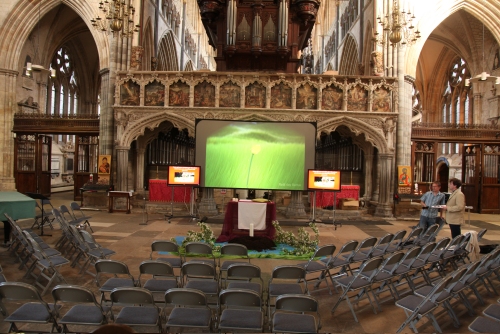
Cathedral Setup with Flower PS3 (image credit: Tobit Emmens)

Flower PS3 Played Beneath the Pipe-Organ (image credit: Tobit Emmens)
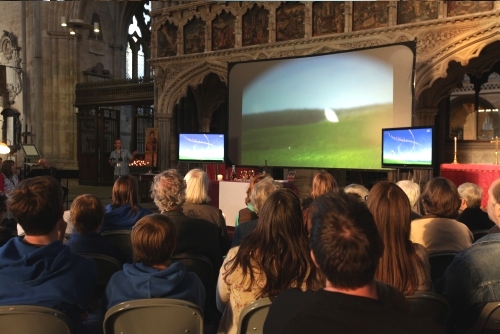
Andy Robertson Introduces and Explains Flower (image credit: Tobit Emmens)

Andy Robertson Introduces and Explains Flower (image credit: Tobit Emmens)
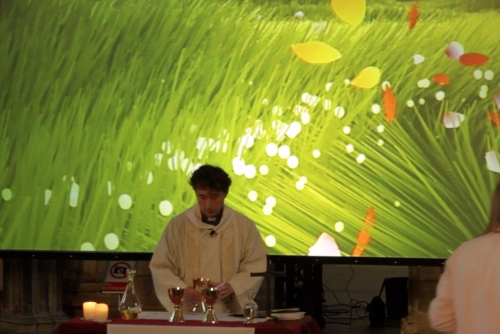
Eucharist In Front of Flower (image credit: Tobit Emmens)
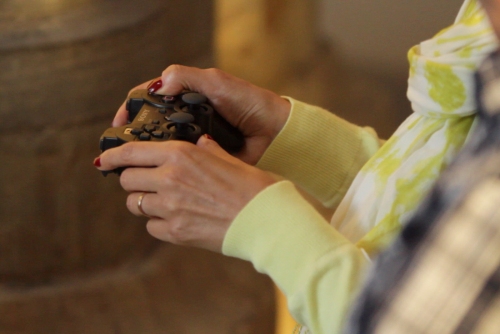
Congregant Takes a Turn on the Controller (image credit: Tobit Emmens)



Andy Robertson writes the Faithful Gamer column.
"Videogame reviews for the whole family, not just the kids. I dig out videogame experiences to intrigue and interest grownups and children. This is post-hardcore gaming where accessibility, emotion and storytelling are as important as realism, explosions and bravado."
© GamePeople 2006-13 | Contact | Huh?

|
Family Video Game Age Ratings | Home | About | Radio shows | Columnists | Competitions | Contact
With so many different perspectives it can be hard to know where to start - a little like walking into a crowded pub. Sorry about that. But so far we've not found a way to streamline our review output - there's basically too much of it. So, rather than dilute things for newcomers we have decided to live with the hubbub while helping new readers find the columnists they will enjoy. |
Our columnists each focus on a particular perspective and fall into one of the following types of gamers:
|